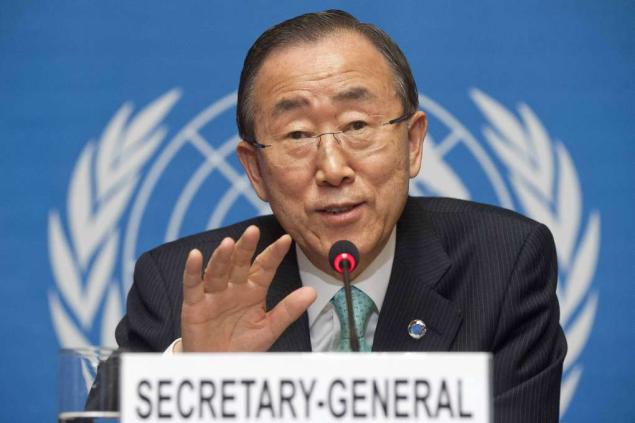UN Secretary-General Ban Ki-moon said given the scale of the disaster in South Sudan, the UN Security Council, African Union and the international community must step up to their responsibility to help the country’s citizens who have suffered through three years of bloody conflict.
The UN chief said this in an opinion piece.
Ban recalled that following decades of war, South Sudan became the world’s newest country five years ago.
He said when he attended the 2011 independence celebrations in the capital, Juba, “hopes were high that the long-suffering people of the oil-rich country would finally see the fruits of a peace dividend after a prolonged civil war. Instead, the people of South Sudan now face a more dismal anniversary”.
He, however, regretted that tens of thousands have been killed, the country’s social fabric has been “shattered,” the economy is ruined, millions have fled their homes, and hunger and poverty prevail.
The UN Secretary-General said it was unacceptable that more than six million people are currently in need of life-saving aid.
“Meanwhile, restrictions imposed by the Government of South Sudan on the UN Mission in the country – UNMISS, and humanitarian organisations – continue to tighten.
“President Salva Kiir has pursued an ethnically-based strategy to suppress dissent, muzzle the media, exclude significant South Sudanese actors in the peace process, and unilaterally implement an agreement to reach elections.”
He said other leaders in the country have intensified the conflict by “manipulating ethnicity for political gain.”
He warned that “the risk of these mass atrocities, which include recurring episodes of ethnic cleansing, escalating into possible genocide is all too real”.
Noting that as the rainy season ends and both sides are gearing up for “another vicious cycle of violence,” Ban said swift action is critical and all leaders within the country are responsible for the restoration of inclusive dialogue.
“If they fail, the international community, the region, and the Security Council in particular, must impose penalties on the leadership on both sides.
“We owe this to the people of South Sudan, who have suffered far too much, for far too long,” Ban warned.
South Sudan has faced ongoing challenges since a political face-off between President Salva Kiir and his Vice-President Riek Machar erupted into full blown conflict in December 2013.
The crisis has produced one of the world’s worst displacement situations with immense suffering for civilians.
In spite of the August 2015 peace agreement that formally ended the war, conflict and instability have also spread to previously unaffected areas in the Greater Equatoria and Greater Bahr-El-Ghazal regions of South Sudan.
Stakeholders in the region and the UN Security Council have been in a deadlock on how to respond to the conflict, in spite of the fact that thousands continue to die and suffer horrendous crimes.
However, Ban insisted that the international community must meet its responsibilities, and noted that while leaders such as the former Malian President Alpha Konaré (the African Union High Representative for South Sudan) had made important strides, far greater action is required.
While the secretary-general has taken important measures to improve UNMISS, he noted that the conflict would not be resolved simply by reinforcing the peacekeeping Mission.
He called for a cessation of hostilities and an authentically inclusive political process and that if it were not to happen immediately, the Security Council should impose an arms embargo along with targeted sanctions to elicit peaceful cooperation from all parties.
The UN chief added that perpetrators of crimes must be held accountable at all levels. (NAN)


